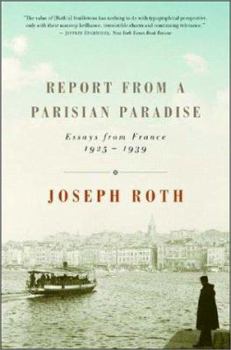Report from a Parisian Paradise: Essays from France, 1925-1939
Select Format
Select Condition 
Book Overview
At one time an underground hero in the world of journalism, with prose on a par with Tolstoy and Kafka, Joseph Roth now looms large in the pantheon of European literature. Indeed, the last five years have seen a major Roth revival culminating in Report from a Parisian Paradise, a haunting epitaph by the greatest foreign correspondent of his age. An exile in Paris, Roth captured the essence of France in the 1920s and 1930s. From the port town of Marseille to the erotic hill country around Avignon, Report from a Parisian Paradise-superbly translated by Michael Hofmann-paints the sepia-tinted landscapes, enchanting people, and ruthless desperation of a country hurtling toward dissolution. Roth's book is not only a paean to a European order that could no longer hold but also a miraculous and revelatory work of transcendent philosophical clarity.
Format:Hardcover
Language:English
ISBN:0393051455
ISBN13:9780393051452
Release Date:December 2003
Publisher:W. W. Norton & Company
Length:301 Pages
Weight:1.15 lbs.
Dimensions:1.0" x 5.8" x 8.5"
Customer Reviews
2 ratings
Joseph Roth in Paris
Published by Thriftbooks.com User , 16 years ago
We are in the midst of a Roth Renaissance--no, not Phillip, but Joseph, who in an all too brief career from 1921-1939 established himself as the greatest newspaper correspondent of his age. His reports from and about Weimar Berlin (1921-1933), "What I Saw" are minutely observed, sharply etched portraits of the "demimondaine" life of a city that boasted 120 newspapers, 40 theaters and great symphonies--a magnet for the aspiring composers, actors and journalists living side-by-side with the emerging Nazi monster. As the goosesteps of the black-booted Nazis became progressively louder, the wary Jewish journalist exiled himself to safety in France in 1925. Fifty of his Parisian gems, written between 1925-1939 can be found in "Report From A Parisian Paradise" As an ardent Francophile you will appreciate Roth's letter to the editor of the Frankfurter Zeitung newspaper almost immediately upon arriving in Paris in which he explains that he is in "complete control of his skeptical intelligence" and though risking "sounding moronic", "Paris is the capital of the world and you must come here. No one who hasn't been here can claim to be more than half human. Every cab driver here is wittier than our authors. I love all of the women here, even the oldest of them to the point of contemplating matrimony." Even when describing the aftermath of unimaginable horror in this description of Maisonette, 'the most terrible battlefield on the Somme his poetic voice is resonant: "The earth was turned over, spattered with chunks of limestone, and with mud that oozed up from the depths. There wasn't a blade of grass or vegetation. Millions of shells rained down. A division clung for months to a hillside. And in the distance they saw the silver water of the Somme, and behind it the shining red roofs of Péronne, and on the left the green, blooming land--the other country, enemy country, that they yearned for as for a woman. Now larks fizz through the air; the rain has stopped; the wind has blown away the clouds. Anyone who didn't see the war would think this was peace. But I can sense red blood running through the veins of the surviving trees, though the clumps of earth, in the delicate filaments of the leaves... Bent over the landscape, like a general over a map, is God. Unapproachable as a general; remote as a general..." Back in Paris he observes children at play in the Jardin du Luxembourg and remarks that: "French children behave with the ease and confidence of grown-ups. It's not so much a matter of race and blood as it is the consequence of the warm, loving, nurturing softness in the way they are brought up. The French pedagogical principle is not Spartan strictness but Roman freedom accorded to the individual disposition--it's not discipline but civilization." And as a critic of the newly evolving film with sound he is smitten with René Clair's classic "Sous Les Toits de Paris (1930)" He writes: "The action of this film emerges from th
Incandescent
Published by Thriftbooks.com User , 20 years ago
A true gift for anyone that loves writing, observation, and life, and an absolute gem for anyone that has ever been to or loved France. Heartbreakingly intelligent, perceptive, and compassionate writing from a master. Get this for yourself and all those you love (since you won't want to part with your copy).





